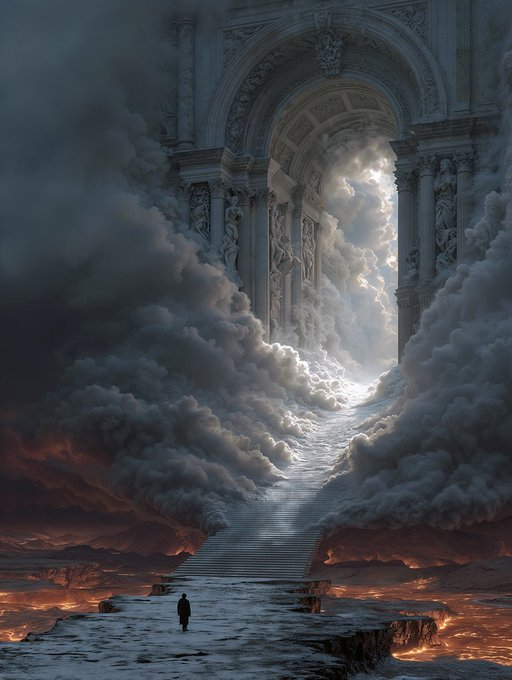Would I end the suffering of man? I would, and I have.
- Ascribe

- Sep 1, 2024
- 4 min read
Updated: Jan 3, 2025
My vision over the last few days seems split —that my heart is crushed with the decimation of war, so many lives lost, so many children, a sacrifice of the innocent by man for his gods of power and wealth. Is this not the sin of Molech upon man? But then I seek your face, your presence that would calm my being, would bring a peace to my heart. For do You also see? Must this last so long, must there be so many?

The heaviness and sorrow of the heart lies upon both of us — you for a short while and Me for a moment, yet being centuries. My love is for all, My salvation for all, and I would shelter the innocent eternally within My heart.
Would I end the suffering of man? I would, and I have, if men would embrace that which I have sacrificed for them. And this they know, but would seek not My way but their own. And in that way suffering descends upon many who walk with Me.
But I also wait for men to rise up against the oppressor, the one who would crush hearts, erase the path forward, end life. Victory over him has been given freely to all men, and I await all men to claim this victory for which One has sacrificed. Only in this is death overcome, does the slaughter cease, is war ended.
It is the choice among men to walk with God or alone. This is what you are seeing, not a split of an either/or perception you may have, but the ongoing struggle of all men: the choice is becoming much more separated, much more polarizing for the heart. Men are seeing the defining difference ever more clearly — and ever more dearly will the heart have to choose.
And in this valley of decision for all men you encountered briefly a beauty unmatched, unseen by you before — and in your awareness did you miss it? How much more for others who are not aware as you. There is always a choice within every moment.
Would I end the suffering of man? I would, and I have, if men would embrace that which I have sacrificed for them. And this they know, but would seek not My way but their own. And in that way suffering descends upon many who walk with Me.
The narrative tells us that there's a continuous offer of relief from suffering. God isn't punishing or withholding; instead, there's an open invitation to partake in a life where suffering is addressed. The uplifting part is the enduring patience and love, always waiting for the return, always ready to soothe the weary traveler.
So, in this light, the message is one of hope: there's always a path back to peace, a way provided to alleviate suffering, if only we choose to walk it, learn from our adventures, and appreciate the sanctuary offered to us.
But I also wait for men to rise up against the oppressor, the one who would crush hearts, erase the path forward, end life. Victory over him has been given freely to all men, and I await all men to claim this victory for which One has sacrificed. Only in this is death overcome, does the slaughter cease, is war ended.
He underscores a divine plan where justice against oppression is promised, but also emphasizes human responsibility in engaging with this divine plan.
There is a continuous battle between good and evil, where His intervention has provided the tools for victory, but human action is still required.
Does one sense an underlying theme of hope? Despite the darkness and oppression, there's a pathway to redemption and peace, which is both ordained by Him and humanly accessible.
It is the choice among men to walk with God or alone. This is what you are seeing, not a split of an either/or perception you may have, but the ongoing struggle of all men: the choice is becoming much more separated, much more polarizing for the heart. Men are seeing the defining difference ever more clearly – and ever more dearly will the heart have to choose.
In the quiet moments of life, each person stands at a crossroads, not of paths visible to the eye, but of the spirit. This is not merely a choice between two directions, but a profound decision that echoes through the chambers of the heart.
What you witness isn't simply division or disagreement among people, but a deeper, more personal struggle. It's as if humanity is being asked, with increasing clarity and urgency, to choose their companion for the journey of life: to walk hand in hand with God, or to tread the path alone, guided only by one's own shadow.
This choice, once perhaps blurred by the distractions of daily existence, now sharpens into focus. The lines between these two ways of being are drawing apart, not just in thought but in the very essence of our being.
The heart, that ancient compass, feels this polarization acutely. Each decision, each step taken, now carries a weight, a significance that wasn't felt as before. Men and women are beginning to see, with a clarity that can be both enlightening and daunting, the stark contrast between these paths.
This isn't about mere preference or opinion; it's about the soul's alignment: the choice to walk with God, to live in harmony with a higher purpose, or to forge one's own solitary path, independent yet isolated, becomes ever more defining.
In this age, the heart must choose, not lightly or in passing, but with the full weight of its conviction. For in this choice lies not just the direction of one's life, but the essence of one's existence. The heart thus becomes the battlefield where this silent, yet profound war is waged, where every beat echoes the struggle between companionship with Him and the solitude of self-reliance.
This is the human drama unfolding, not in grand gestures or public declarations, but in the quiet, intimate spaces within each of us, where the choice to walk with God or alone shapes not just our paths, but the very nature of our journey through life.






Comments